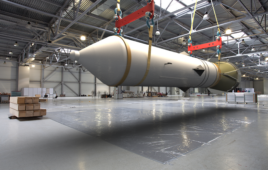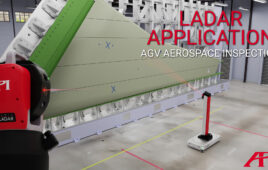Recent technological advances have made the longstanding dream of on-orbit robotic servicing of satellites a near-term possibility. The potential advantages of that unprecedented capability are enormous. Instead of designing their satellites to accommodate the harsh reality that, once launched, their investments could never be repaired or upgraded, satellite owners could use robotic vehicles to physically inspect, assist, and modify their on-orbit assets. That could significantly lower construction and deployment costs while dramatically extending satellite utility, resilience, and reliability.
In fact, efforts to achieve the goal of on-orbit servicing are already underway, including DARPA’s Robotic Servicing of Geosynchronous Satellite (RSGS) program which focuses on services for satellites in geosynchronous orbit. But these efforts all face a major roadblock: the lack of clear, widely accepted technical and safety standards for responsible performance of on-orbit activities involving commercial satellites, including rendezvous and proximity operations (RPO) that don’t involve physical contact with satellites and robotic servicing operations that would. Without these standards, the long-term sustainability of outer space operations is potentially at risk.
To help overcome these challenges and provide the foundation for a new commercial repertoire of robust space-based capabilities, DARPA is creating the Consortium for Execution of Rendezvous and Servicing Operations (CONFERS). Through CONFERS, DARPA aims to establish an industry/government forum composed of experts from throughout the space community. Participants would leverage best practices from government and industry to research, develop, and publish non-binding, consensus-derived technical and safety standards for on-orbit servicing operations. In doing so, the program would provide a clear technical basis for definitions and expectations of responsible behavior in outer space.
“We’re inviting the space community to join us in creating a permanent, self-sustaining ‘one-stop shop’ where industry can collaborate and engage with the U.S. Government about on-orbit servicing, as well as drive the creation of the standards that future servicing providers will follow,” said Todd Master, DARPA program manager. “These standards would integrate data, expertise, and experience from both government and industry while protecting commercial participants’ financial and strategic interests, and provide investors, insurers, potential customers, and other stakeholders with the confidence to pursue and engage in this promising new sector.”
“By working to develop consensus standards, CONFERS has the potential to reduce financial, regulatory, and diplomatic risks and nurture an exciting technological opportunity,” said Brad Tousley, director of DARPA’s Tactical Technology Office, which oversees both CONFERS and RSGS. “CONFERS is a high priority for DARPA.”
The CONFERS program would be executed by an administrative organization that would address the primary areas of consortium organization, technical leadership and management, and standards development. DARPA aims to transfer CONFERS leadership and funding to industry before FY2021, the year in which the Agency is scheduled to perform its first on-orbit demonstration of RSGS.
DARPA will host a Proposers Day on Friday, December 16, 2016, at DARPA’s offices in Arlington, Va., to further clarify the program vision and answer questions from potential proposers. Advance registration is required: http://ow.ly/FWpy30636zs. Additional details are provided in a Special Notice: http://go.usa.gov/xkSyQ. Full program details, including instructions for submitting a proposal, will be made available in a forthcoming Broad Agency Announcement (BAA) on the Federal Business Opportunities website: http://go.usa.gov/xkhCj. For more information, please email [email protected].
Filed Under: Aerospace + defense




